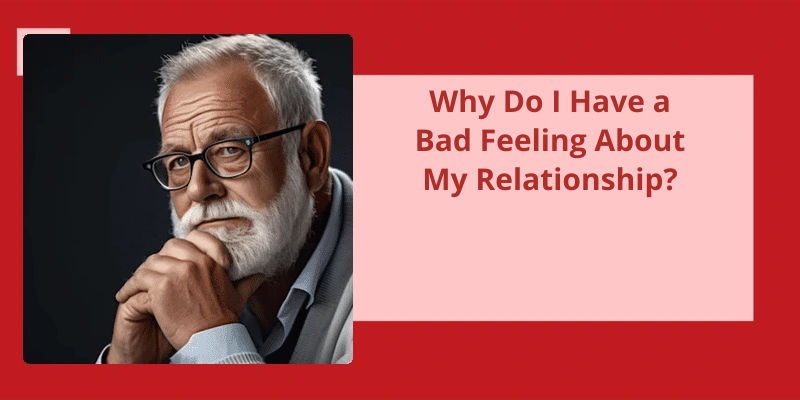As human beings, we’re very intuitive and often rely on our gut instincts to make important decisions in our lives. When it comes to relationships, we all want to feel happy, loved and fulfilled. However, there are times when we may experience a sense of unease or discomfort that we just can't shake off. This could be a warning sign that something isn't quite right in our relationship. While it's natural to have ups and downs in any relationship, having a persistent feeling of unease or discontent may indicate that there are deeper issues at play. In this article, we'll explore some common reasons why people may have a bad feeling about their relationship and how to address them. Whether you’re going through a rough patch in your relationship or just starting to question whether your partner is the right fit for you, it's important to listen to your intuition and take steps to protect your emotional well-being.
Why Does My Relationship Feel Off?
There could be a variety of reasons why your relationship feels off, but it’s important to identify the underlying factors that could be contributing to your feelings of unease or dissatisfaction. One of the most common reasons is a lack of investment from your partner, whether thats in terms of time, emotional energy, or commitment. If you feel like your partner isnt as invested in the relationship as you are, it can lead to feelings of resentment, frustration, and even anger.
This could manifest in a variety of ways, such as not listening when you talk, not making time for you, or not showing affection or appreciation. When you feel like youre not getting the attention you need from your partner, it can be painful and lead to feelings of neglect or abandonment.
Doubts about your compatibility can also make your relationship feel off. If you and your partner have different values, beliefs, or life goals, it can create conflict and make it difficult to build a strong, lasting relationship. If youre not on the same page about what you want in life, it’s important to have honest conversations and try to find a compromise that works for both of you.
When communication breaks down, it can create misunderstandings, hurt feelings, and resentment. It’s important to be open and honest with your partner about your thoughts and feelings, even if theyre difficult to express. If youre struggling to communicate effectively, consider seeing a couples therapist who can help you learn new skills and techniques for better communication.
Finally, your relationship may feel off if there are unresolved issues from the past that are affecting your current dynamic. These can include past conflicts that were never resolved, trust issues, or baggage from previous relationships. If youre struggling to move past these issues on your own, it may be helpful to seek the guidance of a couples therapist who can help you work through them together. Remember, it’s never too late to improve your relationship and find a path to greater happiness and fulfillment.
However, there are also more subtle reasons why someone might feel unhappy in their relationship. These underlying issues can be difficult to pinpoint, but they can have a significant impact on overall happiness and satisfaction within the partnership. In this article, we will explore some of the less obvious reasons why you might be feeling unhappy in your relationship and offer some suggestions for how to address these issues.
Why Do I Feel So Unhappy in My Relationship?
Whatever the reason may be, it’s important to identify the root cause of your unhappiness in the relationship. If you’re feeling unfulfilled or unsatisfied, it may be time to sit down with your partner and have an honest discussion about your needs and wants.
It’s also important to remember that relationships take work. If you want to maintain a healthy and happy relationship, you must be willing to put in the effort. This includes making time for each other, showing appreciation and affection, and being supportive and understanding of one another.
If your partner is exhibiting behaviors that are causing you to feel unhappy, it may be time to seek outside help. Counseling or therapy can be a valuable resource for working through relationship issues and learning effective communication and problem-solving skills.
Ultimately, the decision to stay in a relationship or move on is up to you. It’s important to prioritize your own happiness and well-being. If you feel that the relationship is no longer serving you, it may be time to let go and move on to a more fulfilling path.
It’s not uncommon to feel a sense of discomfort in relationships, but pinpointing the root cause can be challenging. However, one possible reason for this feeling is a lack of security, which can lead to anxiety and doubts about the relationship. In this article, we’ll explore some of the reasons behind discomfort in relationships and what you can do to address it.
Why Do I Feel Discomfort in My Relationship?
Another reason you may feel discomfort in your relationship is because of a lack of communication. If you and your partner arent talking openly and honestly, it can create tension and mistrust. This can be especially true if you’ve expectations that arent being met, but you arent expressing them. It’s important to have open and honest conversations regularly, to ensure that both parties are on the same page.
The root of discomfort in a relationship can also be traced back to past traumas and experiences. If youve experienced emotional or physical trauma in the past, it can affect how you view and interact in relationships. This kind of discomfort can manifest in different ways, from extreme jealousy to always being on guard in a relationship. It’s important to recognize these patterns and seek therapy or counseling to work through them.
Personal insecurities can also create discomfort in a relationship. If youre insecure about your appearance, abilities or self-worth, it can be hard to believe that someone else truly loves and desires you. This can lead to constant reassurance-seeking behaviors, which can put strain on a relationship. It’s important to work on building your self-esteem and confidence, so that you can maintain a healthy relationship.
Finally, change can be a source of discomfort in a relationship. As people grow and evolve, their wants, needs and priorities change. If you and your partner arent growing together, it can lead to discomfort and even resentment. It’s important to create space for growth and change within a relationship, and to communicate openly about how youre evolving as individuals and a couple.
It’s not uncommon to experience feelings of unhappiness in a relationship at times, but recognizing when these emotions persist and have a negative impact on your well-being is essential. It’s important to look out for the signs and take steps to address them to maintain a healthy and fulfilling relationship. Here are some common signs that may indicate you’re feeling unhappy in your relationship.
How Do You Know if You’re Unhappy in a Relationship?
, I was talking to a friend of mine about relationships, and she mentioned how she was feeling unhappy in her current relationship. She’d been with her partner for several years, and although she loved him, she felt like something was missing. This got me thinking about how we know if were unhappy in a relationship and what’re the common signs to look out for.
One common sign that you may be feeling unhappy in a relationship is if you constantly have the urge to be with someone else. This could be a sign that youre not fulfilled or satisfied in your current relationship. It’s important to explore these feelings and identify what’s causing them before making any decisions.
Another sign that you may be unhappy is if you feel like you’d be happier living a different life. This could mean that youre not happy with the choices youve made or the direction your life is headed in. It’s important to figure out what changes you need to make to feel happy and fulfilled.
If you find yourself not attracted to your partner anymore, this could be another sign that youre unhappy. It’s important to not ignore these feelings and to figure out what’s causing them. It could be a sign that you need to work on your relationship or that it’s time to move on.
Using substances to avoid thinking about your conflicts is another sign that you may be feeling unhappy in your relationship. This isn’t a healthy way to cope with problems and could lead to more serious issues down the line. It’s important to address any conflicts head-on and find healthy ways to communicate with your partner.
This could include feeling the urge to be with someone else, feeling like you’d be happier living a different life, not being attracted to your partner anymore, and using substances to avoid thinking about your conflicts. If these efforts are unsuccessful, it may be time to consider ending the relationship and moving on to find happiness and fulfillment.
It’s important to recognize that relationships aren’t always sunshine and rainbows. People go through different emotions and conflicts in their relationships, and it’s natural to feel unhappy or unfulfilled at times. However, when these negative feelings become more frequent and start to negatively impact your daily life and priorities, it may be time to reevaluate the relationship.
Is It Normal to Feel Bad in a Relationship?
Relationships can be a rollercoaster of emotions, and it’s not uncommon to experience periods of unhappiness or disconnection. However, there are certain warning signs that suggest there may be deeper issues at play. If you find yourself feeling consistently unfulfilled or unappreciated, it’s important to take a step back and evaluate whether your needs and wants are being met in the relationship.
It’s also worth reflecting on whether you’re truly compatible with your partner, and whether your values and goals align. When there’s a fundamental mismatch in these areas, it can be difficult to feel truly satisfied or content in the relationship. Similarly, if you or your partner have unresolved personal issues or emotional baggage, it can make it hard to connect and communicate effectively.
While it’s important to acknowledge and honor your feelings, it’s also essential to communicate openly and honestly with your partner. Start by expressing your concerns and needs in a calm and non-accusatory manner, and be open to listening to their perspective as well. Together, you may be able to work through the underlying issues and find a way to strengthen your bond.
Ultimately, it’s important to remember that relationships require effort and commitment from both parties. If you’re consistently feeling unhappy or disengaged, it may be time to reassess whether this is the right relationship for you. No one should be made to feel constantly unfulfilled or unsupported, and it’s okay to prioritize your own well-being and happiness.
Source: How to Know if You’re in an Unhappy Relationship – Oprah Daily
While trusting your gut feeling is a commonly accepted practice, it’s not always foolproof. When it comes to relationships, your intuition may tell you one thing, while your desires and wants may be in conflict. In such situations, it’s essential to take a step back, evaluate your emotions and thought processes, and examine how your gut feeling aligns with your goals for the relationship.
Can Your Gut Feeling Be Wrong in a Relationship?
Intuition is a powerful tool that humans have evolved to have. Your gut feeling is a sensation that arises instinctively within your body. We all have experienced situations where our gut feeling warns us of impending danger or alerts us to something that isn’t quite right. In relationships, your gut feeling may indicate to you that something isn’t right, but this doesn’t mean that your intuition is wrong.
If youre feeling apprehensive about a relationship, it’s essential to evaluate why youre feeling that way. Is it because of a past experience that you’d and are projecting onto this relationship? Or is there something specific about the relationship thats causing your intuition to react? When were emotionally invested in a relationship, it can be challenging to separate our emotions from our intuition and trust our instincts.
If your gut feeling is different from what you want for your relationship, it’s essential to listen to both your gut and your heart when making decisions. Your intuition is giving you a signal that something isnt quite right, and it’s worth examining why that is. At the same time, you need to consider what you want from the relationship and whether it aligns with your partners wants and needs. In some cases, your gut feeling may be accurate, but your desires for the relationship are clouding your judgment.
It’s a primal instinct that we’ve developed that can help keep us safe and healthy. However, in relationships, it can become complicated when we’re emotionally invested. It’s essential to listen to your gut feeling but also evaluate why youre feeling that way. By taking the time to examine these aspects, you can make informed decisions about your relationship.
How to Strengthen Your Intuition and Trust Your Gut Feeling in Relationships
- Practice mindfulness and self-awareness
- Pay attention to your physical sensations
- Trust your initial reactions
- Try to understand your emotions
- Learn from past experiences
- Listen to your inner voice
- Don’t ignore warning signs
- Take time for reflection
- Seek support and guidance from trusted individuals
- Take action based on your intuition
Conclusion
In relationships, it's not uncommon to have bad feelings or doubts from time to time. It's natural to have concerns about the future, about compatibility, or about trust. However, if these negative feelings persist and interfere with your everyday life, it may be time to reevaluate the relationship. Trust your gut, and don't ignore red flags or warning signs. Communication is key in any relationship, and expressing your concerns to your partner can often lead to a better understanding and resolution. Ultimately, prioritize your own well-being and happiness above all else, and don't settle for a relationship that doesn't bring you joy and fulfillment.






